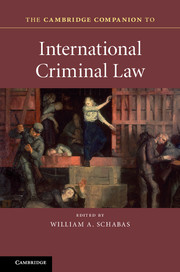Book contents
- Frontmatter
- Dedication
- Contents
- List of contributors
- List of abbreviations
- Introduction
- PART I PURPOSES AND PRINCIPLES
- PART II INSTITUTIONS
- PART III CRIMES
- 10 Atrocity crimes (genocide, crimes against humanity and war crimes)
- 11 Treaty crimes
- 12 Criminalising the illegal use of force
- 13 Children
- PART IV TRIALS
- PART V THE FUTURE
- Index
- References
12 - Criminalising the illegal use of force
from PART III - CRIMES
Published online by Cambridge University Press: 05 December 2015
- Frontmatter
- Dedication
- Contents
- List of contributors
- List of abbreviations
- Introduction
- PART I PURPOSES AND PRINCIPLES
- PART II INSTITUTIONS
- PART III CRIMES
- 10 Atrocity crimes (genocide, crimes against humanity and war crimes)
- 11 Treaty crimes
- 12 Criminalising the illegal use of force
- 13 Children
- PART IV TRIALS
- PART V THE FUTURE
- Index
- References
Summary
The ancient aspiration that the peoples of the earth might someday renounce war-making and ‘beat their swords into plowshares’ seemed to get rather a significant boost with the establishment in 1945 of the UN system. Not long thereafter, the judgment of the International Military Tribunal at Nuremberg made clear that leaders responsible for crimes against peace, war crimes, and crimes against humanity could be criminally prosecuted in their individual capacities for such crimes. Consistent with the UN Charter's determination ‘to save succeeding generations from the scourge of war’, the General Assembly, in its first session, affirmed the principles of international law recognised by the Nuremberg Charter and judgment and called for their formulation within an International Criminal Code, to be developed for later adoption and implementation.
The Cold War had a chilling effect, and it would be half a century before an international criminal code would finally emerge as the Rome Statute of the International Criminal Court. The Conference of Plenipotentiaries which met in Rome in the summer of 1998 was able to agree on granting the Court active jurisdiction over war crimes, crimes against humanity, and genocide – but not over the crime of aggression. Left unresolved in Rome were issues relating to the definition of aggression as well as whether acts of aggression ought to be determined judicially, by an independent Court, rather than by the Security Council. As a compromise, aggression was included within the Court's jurisdiction, but the Court would not be able to exercise its aggression jurisdiction until further hurdles were overcome.
The showdown on this issue would come in May and June of 2010, at a Review Conference of the Rome Statute of the International Criminal Court held in Kampala, Uganda. There, members of the Assembly of States Parties met to consider the adoption of provisions on aggression that, if made effective, would statutorily define the crime and allow the Court to exercise its jurisdiction over it. The Conference succeeded in amending the Statute so as to include a definition of aggression, but activation of the Court's jurisdiction over that particular crime was once again deferred.
The definition adopted in Kampala largely relied on a list of enumerated acts constituting aggression, as set forth in a consensus definition which had been approved by the UN General Assembly in 1974.
- Type
- Chapter
- Information
- The Cambridge Companion to International Criminal Law , pp. 230 - 252Publisher: Cambridge University PressPrint publication year: 2016
References
- 1
- Cited by



